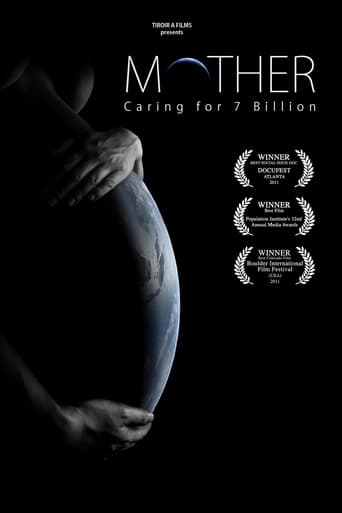Stoutor
It's not great by any means, but it's a pretty good movie that didn't leave me filled with regret for investing time in it.
Huievest
Instead, you get a movie that's enjoyable enough, but leaves you feeling like it could have been much, much more.
Bessie Smyth
Great story, amazing characters, superb action, enthralling cinematography. Yes, this is something I am glad I spent money on.
Phillipa
Strong acting helps the film overcome an uncertain premise and create characters that hold our attention absolutely.
jolynnewhiting
This film is so refreshing because it highlights a very important issue that is not talked about enough.Population growth is a seismic driver of so much poverty for individual women and their families, so much civil unrest (16 of top 20 failed states have a fertility rate over 4) and so much environmental degradation. And yet it has been hushed and does not appear in our daily news.Mother is a very engaging film that pulled me in on an emotional and intellectual basis.And, like good documentaries do, gave me the motivation to make a greater difference on this issue.Being sure that every one of the 200+ million women that want family planning and do not have access get the access they need is the least we can do.
rmaskell-459-841435
In 1970, world population was 3.7 billion which was then regarded as a major contributor to the global environmental crisis. By 2011, world population has risen to 6.8 billion and technology has proved to be a double-edged sword: on one hand, increasing life expectancy, food and goods production; on the other, resulting in unsustainable population growth with concomitant major problems for humanity's continued existence. Infrastructure in most countries has failed to keep pace with the growth being relentlessly promoted by various pressure groups, and in some countries, aspirational middle classes that previously did not exist, all wishing to live at the massively unsustainable consumption level of the United States, have been created.Empowerment and education of women is seen as the primary solution to this impending disaster. Despite advances in contraceptive methods, many pregnancies are unplanned even in advanced societies. However, population growth is greatest in patriarchal societies where women are uneducated and disempowered. If fertility rates can be reduced and the present insatiable urge for growth be curbed, the concepts of Mother Earth and women as agents of global survival are twinned.
Karen Gaia Pitts
This film examines world population that has grown much too fast in recent years; it adequately warns us of the very serious impacts that will result from this growth; and unwinds the mystery of the population taboo that has kept the subject under wraps for a least a couple of decades.The film interviews some of the early population activists and shows how the opinion of these activists has changed, in the 40 years - since the first Earth Day in 1970 - from the idea of 'population control' to a more gentle but effective solution: women's empowerment, voluntary family planning, and women's control over their reproductive function.The film gives a powerful message that says, when women are informed about the freedom of choice that is given by modern birth control, they usually choose to have smaller families - if they have access to birth control - for the health and well-being of all family members. It tells us that 'population control' is not at all necessary, and leaves us with the idea that the population taboo, if everyone watches this film, will be lifted.
Tim Siegenbeek van Heukelom
A new documentary on population growth is always welcome, since talking about 'population' remains a taboo. I sincerely hoped that Mother: Caring for 7 Billion would add some critical thought to the population debate, but have to admit I came away a bit disappointed.There appear to be two parts to the documentary. The first part started extremely promising with a succinct but clear history of the population explosion, framed in the thought of people like Paul Erlich, Lester Brown, and John Feeney. But then, after a good ten minutes, part two begins, which follow the story of Beth Osnes. The story develops by slowly building the case for the empowerment of women, the 'Girl- Effect', and birth control. To me, this is not a new argument and I question if this truly will solve the population problem. Perhaps, this approach is part of the solution, but I would have liked some more critical thought on the subject, for instance some input from Daniel Quinn, and Timothy Bennett. Still, I was certainly glad to see Professor Albert Bartlett make an appearance, although is was very brief.The bottom-line: the documentary is good at raising awareness, but lacks in terms of adding any new critical thought to the population debate.

